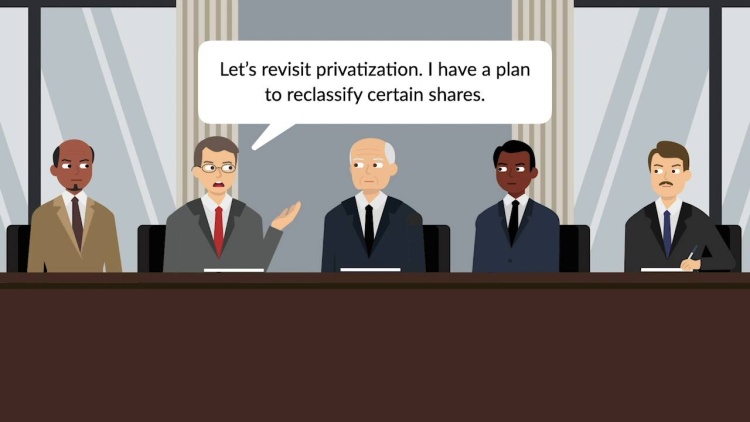Gantler v. Stephens
Delaware Supreme Court
965 A.2d 695 (2009)
- Written by John Caddell, JD
Facts
The board of directors of First Niles Financial, Inc. (First Niles) put the company up for sale in August 2004 and attracted interest from several firms. An offer from Farmers National Banc Corp. (Farmers) was ignored after Farmers stated that it would not retain the First Niles board if its bid were accepted. Cortland Bankcorp (Cortland) and First Place Financial Corp. (First Place) also made offers and submitted due-diligence requests. William Stephens (defendant), First Niles’s chairman and CEO, did not inform the rest of the board of the due-diligence requests. This caused Cortland to drop out of the bidding and First Place to reduce its bid. Ultimately the board rejected First Place’s offer and decided to pursue a privatization plan instead of a sale. Because the privatization plan involved changes to shareholder rights, it required shareholder approval. The board of First Niles submitted a proxy statement to the Securities and Exchange Commission disclosing that each of the directors had a conflict of interest with respect to the privatization plan because, by virtue of their positions, they could structure the plan to their own benefit. The shareholders nonetheless voted in favor of the privatization plan. A group of dissident shareholders (plaintiffs) brought a derivative action against several First Niles directors (defendants), including Stephens. The complaint alleged that the directors breached their fiduciary duty by rejecting a valuable opportunity to sell the company. Three directors, constituting a majority that opposed the sale, were alleged to have had improper personal motives in rejecting First Place’s offer. All wished to preserve their positions. Director Kramer owned a heating-and-cooling company that did work for First Niles, which would presumably be lost in the event of a sale. Director Zuzolo was a principal in a law firm that likewise did work for First Niles. The trial court granted the directors’ motion to dismiss the complaint, on the grounds that (1) the business-judgment rule shielded the directors from duty-of-care claims and (2) the shareholder vote ratified the board’s actions and also served to shield the directors. The dissident shareholders appealed the dismissal.
Rule of Law
Issue
Holding and Reasoning (Jacobs, J.)
What to do next…
Here's why 907,000 law students have relied on our case briefs:
- Written by law professors and practitioners, not other law students. 47,100 briefs, keyed to 996 casebooks. Top-notch customer support.
- The right amount of information, includes the facts, issues, rule of law, holding and reasoning, and any concurrences and dissents.
- Access in your classes, works on your mobile and tablet. Massive library of related video lessons and high quality multiple-choice questions.
- Easy to use, uniform format for every case brief. Written in plain English, not in legalese. Our briefs summarize and simplify; they don’t just repeat the court’s language.





